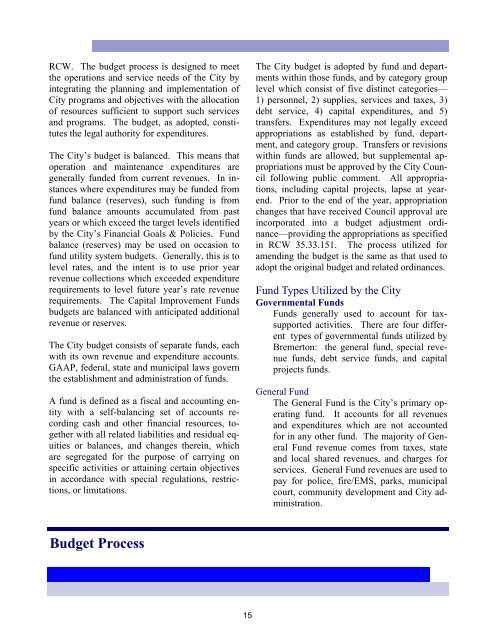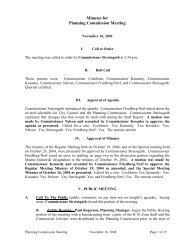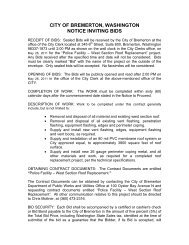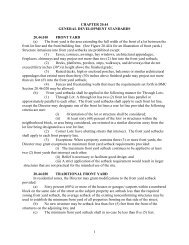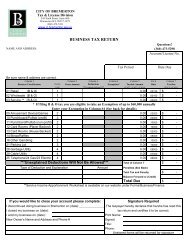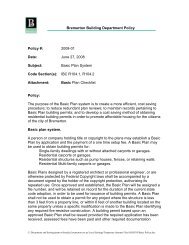2013 Annual Budget - City of Bremerton
2013 Annual Budget - City of Bremerton
2013 Annual Budget - City of Bremerton
You also want an ePaper? Increase the reach of your titles
YUMPU automatically turns print PDFs into web optimized ePapers that Google loves.
RCW. The budget process is designed to meet<br />
the operations and service needs <strong>of</strong> the <strong>City</strong> by<br />
integrating the planning and implementation <strong>of</strong><br />
<strong>City</strong> programs and objectives with the allocation<br />
<strong>of</strong> resources sufficient to support such services<br />
and programs. The budget, as adopted, constitutes<br />
the legal authority for expenditures.<br />
The <strong>City</strong>’s budget is balanced. This means that<br />
operation and maintenance expenditures are<br />
generally funded from current revenues. In instances<br />
where expenditures may be funded from<br />
fund balance (reserves), such funding is from<br />
fund balance amounts accumulated from past<br />
years or which exceed the target levels identified<br />
by the <strong>City</strong>’s Financial Goals & Policies. Fund<br />
balance (reserves) may be used on occasion to<br />
fund utility system budgets. Generally, this is to<br />
level rates, and the intent is to use prior year<br />
revenue collections which exceeded expenditure<br />
requirements to level future year’s rate revenue<br />
requirements. The Capital Improvement Funds<br />
budgets are balanced with anticipated additional<br />
revenue or reserves.<br />
The <strong>City</strong> budget consists <strong>of</strong> separate funds, each<br />
with its own revenue and expenditure accounts.<br />
GAAP, federal, state and municipal laws govern<br />
the establishment and administration <strong>of</strong> funds.<br />
A fund is defined as a fiscal and accounting entity<br />
with a self-balancing set <strong>of</strong> accounts recording<br />
cash and other financial resources, together<br />
with all related liabilities and residual equities<br />
or balances, and changes therein, which<br />
are segregated for the purpose <strong>of</strong> carrying on<br />
specific activities or attaining certain objectives<br />
in accordance with special regulations, restrictions,<br />
or limitations.<br />
The <strong>City</strong> budget is adopted by fund and departments<br />
within those funds, and by category group<br />
level which consist <strong>of</strong> five distinct categories—<br />
1) personnel, 2) supplies, services and taxes, 3)<br />
debt service, 4) capital expenditures, and 5)<br />
transfers. Expenditures may not legally exceed<br />
appropriations as established by fund, department,<br />
and category group. Transfers or revisions<br />
within funds are allowed, but supplemental appropriations<br />
must be approved by the <strong>City</strong> Council<br />
following public comment. All appropriations,<br />
including capital projects, lapse at yearend.<br />
Prior to the end <strong>of</strong> the year, appropriation<br />
changes that have received Council approval are<br />
incorporated into a budget adjustment ordinance—providing<br />
the appropriations as specified<br />
in RCW 35.33.151. The process utilized for<br />
amending the budget is the same as that used to<br />
adopt the original budget and related ordinances.<br />
Fund Types Utilized by the <strong>City</strong><br />
Governmental Funds<br />
Funds generally used to account for taxsupported<br />
activities. There are four different<br />
types <strong>of</strong> governmental funds utilized by<br />
<strong>Bremerton</strong>: the general fund, special revenue<br />
funds, debt service funds, and capital<br />
projects funds.<br />
General Fund<br />
The General Fund is the <strong>City</strong>’s primary operating<br />
fund. It accounts for all revenues<br />
and expenditures which are not accounted<br />
for in any other fund. The majority <strong>of</strong> General<br />
Fund revenue comes from taxes, state<br />
and local shared revenues, and charges for<br />
services. General Fund revenues are used to<br />
pay for police, fire/EMS, parks, municipal<br />
court, community development and <strong>City</strong> administration.<br />
<strong>Budget</strong> Process<br />
15


